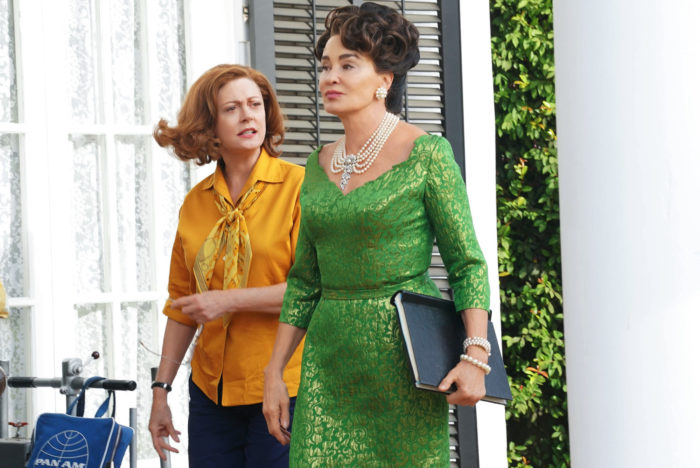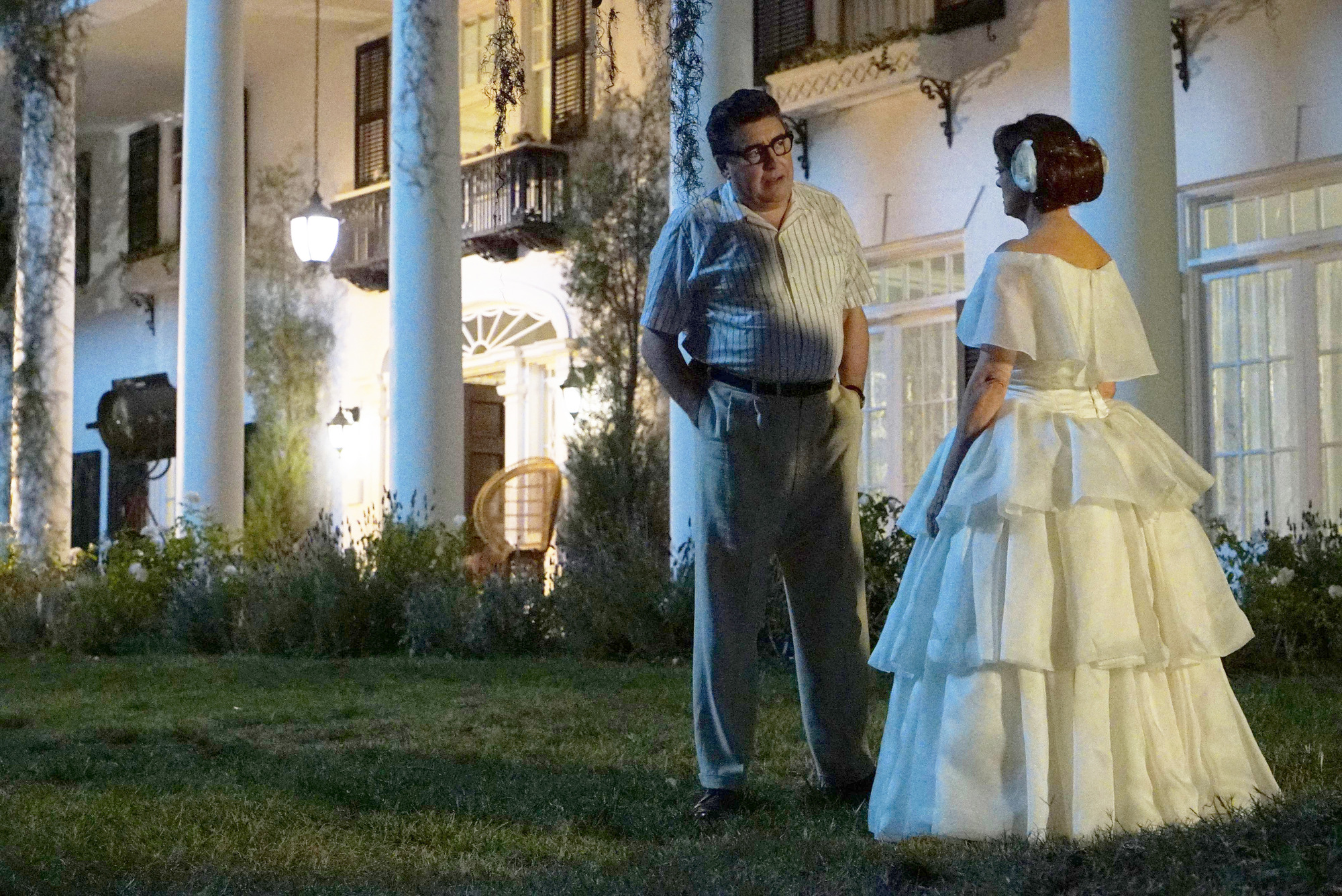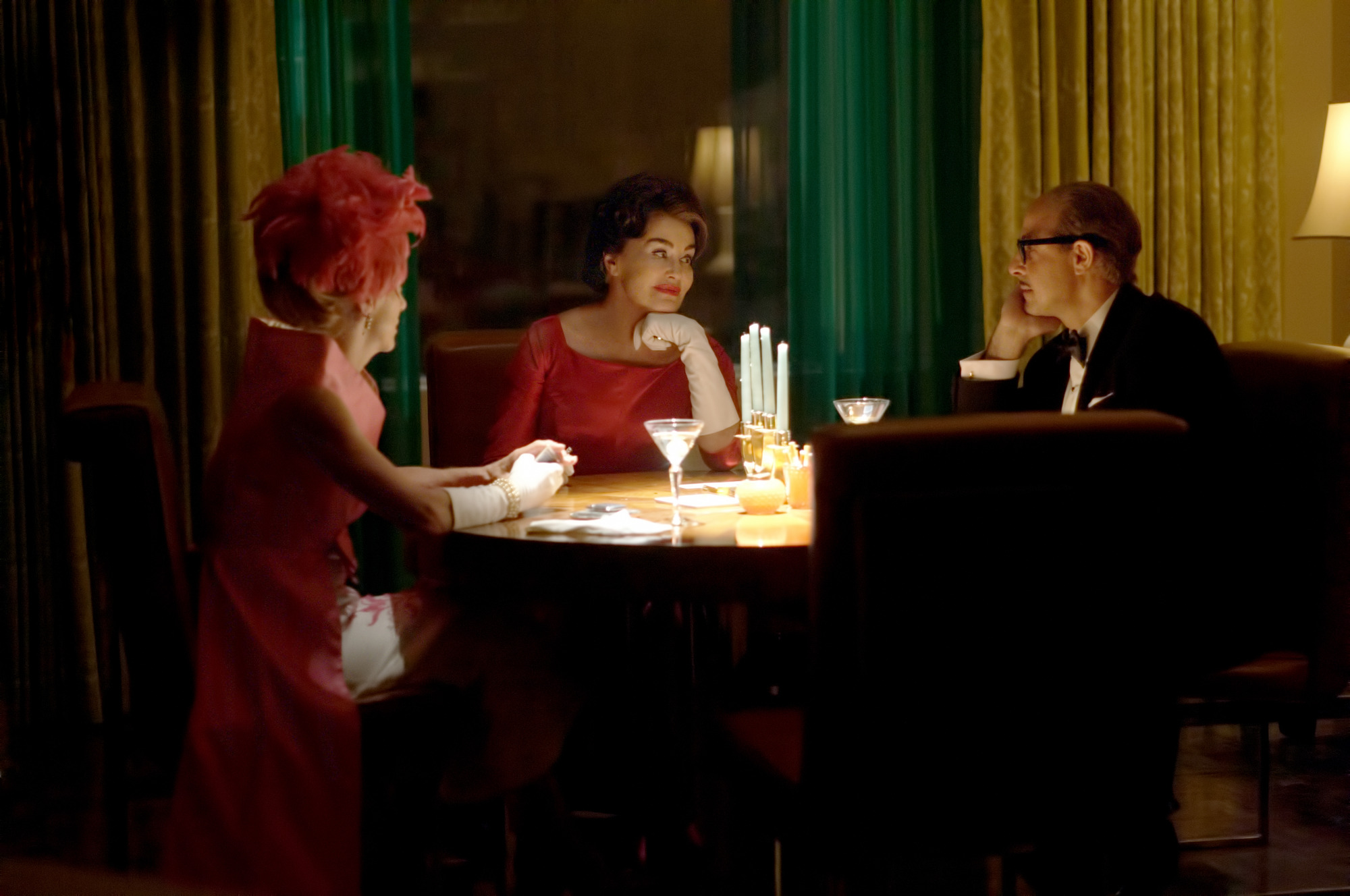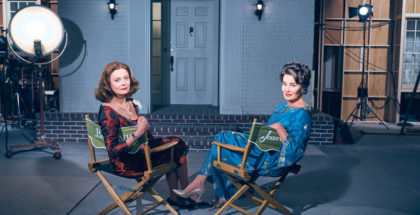UK TV review: Feud: Bette and Joan (spoilers)
Review Overview
Period fun
9Modern relevance
9David Farnor | On 06, Jan 2018
Warning: This contains spoilers for Feud: Bette and Joan. Not caught up? Read our spoiler-free review of the opening episodes here.
“Men age, they get character. Women age, they get lost.”
That’s the simple, sad truth uttered by a make-up artist to Joan Crawford (Jessica Lange) at the start of Feud: Bette and Joan, and it’s a sentiment that sits at the very heart of Ryan Murphy’s sensational drama. The eight-part show charts, of course, the bitter rivalry that went on behind the scenes of Whatever Happened to Baby Jane?, which saw Crawford act opposite her fierce enemy, Bette Davis (Susan Sarandon). But what begins as a delightfully wicked treat, as we see the two physically come to blows on camera, emerges as a tragically pertinent tale of Hollywood misogyny.
Los Angeles, in case you’ve somehow missed every news headline of the last six months, is at a crucial point in history, as the industry’s rampant, decades-old sexism is being exposed and, one hopes, expunged, as brave victims of abuse come forward to name those who have despicably exploited their power over the years. That sexism, back in the 1960s, was all considered part of showbiz, but it extends into all corners of the film world, shaping, limiting and ruining women’s careers and lives. When it comes to off-camera scandals, Bette and Joan are two of the most prominent figures in cinema legend, but Ryan Murphy’s series explores the far-reaching effects of their spat, from the genuine dislike that blossomed between the pair to the way that it was simultaneously encouraged, manipulated and staged by the men around them.
It’s telling that the show spends as much time studying the aftermath of Baby Jane, as it does recreating the famous production. Indeed, the fact that we even consider Bette and Joan’s tale to be one of two women sabotaging each other says a lot about the way the industry perceives and presents itself.
Over the course of the eight hours, Murphy’s script gives more and more time to Jack Warner (Stanley Tucci) and director Bob Aldrich (Alfred Molina), as they needle and bully both Bette and Joan to make their picture as much of a success as possible. Tucci is brilliantly nasty, a businessman and the last of Hollywood’s all-powerful moguls, a moustached money-maker, who finds himself years after Baby Jane struggling to make a hit. His answer? Bring back Bob and get him to reunite Joan and Bette for Whatever Happened to Sweet Charlotte?. He’s even coined a name for the genre: Hagsploitation.
Alfred Molina is just as good as the put-upon helmer, a man trying to support his wife and family while make a mark on the world – despite the fact that he seems destined only to make B-movies and second-rate pictures. He tries to involve his family in Sweet Charlotte, to stop his wife leaving. He encourages his assistant, Pauline (Alison Wright), when she presents him with her own script he wants to direct.
“Why do you sound so surprised?” he chuckles, when she hears his response. “Some men find it off-putting, imagining a women in charge,” she explains. “What men?” he scoffs. “Oh, your friends at the old folks home?”
But Murphy’s script makes it clear that even Bob, alas, is part of the problem: only a couple of episodes later, he’s dismissed Alison’s script altogether, and snaps at her, as the pressure of directing Bette and Joan together again eats into him. He may have good intentions to change the way the industry works, but when it comes down it, his primary concern is his own career.
In such an atmosphere, then, it’s no surprise that Bette and Joan should find it so easy to blame each other for the other’s perceived success. The delightful Episode 4 – which sees Halt and Catch Fire’s underrated Toby Huss steal scenes as a petty, bullying Frank Sinatra – sits back and cackles with glee, as it watches Crawford slowly plan a coup at the Oscars, where Bette is nominated for Baby Jane ahead of her. Orchestrating the whole thing right down to taking over the green room and making it her own private party, she waltzes past Bette in the wings to collect the Best Actress Oscar on behalf of the absent Anne Bancroft – an act so brazenly calculated you’ll be howling at the screen.
That whole incident is plotted in cooperation with Hedda Hopper (Judy Davis), the gossip columnist who flits between the two with a gloriously catty enthusiasm. Bette, she notes, considers them to be hypocrites. “Aren’t we all hypocrites?” Joan asks. “Well, yes,” comes the sharp riposte. “But I don’t want to be judged for it.”
The screenplay is full of such witty exchanges, and it’s delivered with aplomb by Sarandon’s fiery Davis and Lange’s spiteful Crawford. But the more time we spend with them, the more we see the tragedy lying underneath their always-on facade. Both simply wanting affection and respect, they have fought to get to where they are. “Would it make you happy?” asks Bancroft, when the idea of Joan accepting her award comes up in conversation. “Desperately,” says Lange’s Crawford, her lip quivering not with the relish of one-upmanship, but the tremor of long-awaited recognition.
“This town has always been a boys’ club. And the boys are not going to be polite,” the duo agree, as they meet on the set of Charlotte and decide to work together for once. But alas, that union doesn’t last long, as Crawford discovers that Davis has been given a producer role on the project – and Davis uses that authority to get her revenge on Joan at every opportunity. Their solidarity dissipates with a poignant predictability, one that genuinely hurts Crawford, who had started to trust in her friendship with her nemesis. Bette, meanwhile, displays a rare moment of vulnerability, when she confesses to Bob that on her first screen test, Jack Warner told her she had “zero sex appeal” and that he wished she looked more like Joan.
A heartbreaking confrontation on the doorstep of Davis’ room is performed with sincere pathos by both women, as we get one of many glimpses of what could have been a powerful partnership. “How did it feel to be the most beautiful girl in the world?” asks Bette, bitterly. “It was wonderful,” smiles Crawford, triumphantly, before it fades. “But it was never enough.” “How did it feel to be the most talented girl in the world?” Crawford asks in turn. “Great,” snaps Bette. “But it was never enough.”
That unhappiness doesn’t just undermine film shoots – although Crawford’s pretence of illness in response to Davis cutting her lines on Sweet Charlotte does threaten the whole project (Davis, arguably, is portrayed as the more professional of the two) – it also seeps into their personal lives. Both women have soured relationships with their children (a shout-out, once more, to Mad Men’s Kiernan Shipka as BD, who can’t even get Bette’s approval for a marriage), and both grow old alone, unable to share a reconciliatory phone call, after so many years of real and stoked hatred. Davis, even as she ages, becomes aware that if she does not say something spiteful about Crawford, her persona and reputation will diminish. Crawford, meanwhile, writes a memoir about female beauty, only to realise people mostly remember her for her amusing animosity with Davis. (And, in some circles, for her performance in the sci-fi movie Trog.)
All of this is framed brilliantly by a 70s documentary on Joan, which primarily consists of vox pops with Olivia de Havilland. Played by an unrecognisable Catherine Zeta-Jones – and also, curiously, the subject of legal disputes in real life from the actual Olivia, who objects to their portrayal of her – her knowing insights into the pair is interesting enough, but it’s also a device laced with melancholy, because we learn that Olivia was the one who ultimately replaced Crawford on Sweet Charlotte.
“50 years in show business and they gave her two seconds,” muses Victor Buono (Dominic Burgess, whose charming presence grows to become something of a confidante for Bette), when they see the brief tribute to Joan in the Oscars’ In Memoriam section, following her death. “That’s all we’ll ever get,” Bette harshly sums up.
Even in 2017, it’s a treat to see both women get their fair share of screen-time. Indeed, the whole programme is full of the kind of older female characters often missing from modern screens, not to mention a horde of women directors – in itself, a rebuttal to outdated industry convention. Helen Hunt kicks off her episode with a wonderful aerial shot on Sweet Charlotte’s set, while Gwyneth Horder-Payton’s helming of the finale finds room for a touching hallucination by an on-death’s-door Joan, which brings together Jack, Hedda, Bette and a young Crawford for a warm dinner conversation. They end their feud in that glowing chat, as Jack sneakily avoids apologising for the way he treated them, even in Crawford’s imagination.
“Will all the pain be worth it?” Crawford asks, as they broach the subject of their mistreatment, and the way mature women are cast aside by showbiz. With her illness accelerating her decline in her final years, Joan becomes more of a conventionally tragic figure than Davis, one suspects mostly for the ease of narrative, but Murphy’s Feud manages to be a fond tribute to both actors, whose work still lives on, and a damning reminder that their pain is horribly recognisable for many women in the movie world today. Even as we get one last taste of two talented stars supporting and connecting with each other, Feud’s final shot seals their fate, as they’re forever destined to separate and sit in their own isolated trailers. Hilarious, moving, and sharply topical, this mini-series sits among the most handsomely made TV productions of the last year.
Feud: Better and Joan is available on Disney+ UK, as part of a £7.99 monthly subscription or a £79.99 yearly subscription.
Where can I buy or rent Feud online in the UK?
Photo: FOX






















